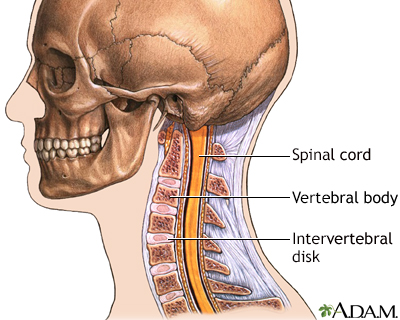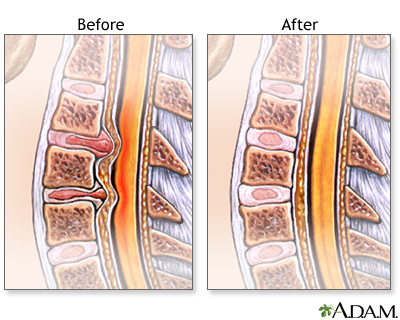Spinal surgery - cervical - series

Normal anatomy
The cervical spinal column is made up of vertebral bodies which protect the spinal cord.

Indications
Cervical spine disease is usually caused by herniated intervertebral discs, abnormal growth of bony processes on the vertebral bodies (osteophytes), which compress spinal nerves, trauma, and narrowing (stenosis) of the spinal column around the spinal cord.
Symptoms of cervical spine problems include:
- Pain that interferes with daily activities
- Neck pain that extends (radiates) to the shoulder or arm
- Weakness of arms or legs
- Numbness of arms, hands, or fingers

Incision
The surgery is done while the patient is deep asleep and pain-free (general anesthesia). For the neck (cervical spine), an incision may be made either in the back of the neck (posterior cervical) or in the front side of the neck (anterior cervical), depending on the location of the problem.

Procedure
The bone that curves around and covers the spinal cord (lamina) is removed (laminectomy) and the tissue that is causing pressure on the nerve or spinal cord is removed. The hole through which the nerve passes can be enlarged to prevent further pressure on the nerve.
If an intervertebral disc herniation is present, the intervertebral disc is removed. Sometimes, a piece of bone (bone graft) or metal rods (such as Harrington rods) may be used to strengthen the area of surgery.

Aftercare
Depending on the disease present and the surgery performed, mobility of the cervical spine may be limited after cervical spine surgery. Physical therapy is often indicated after surgery.
BACK TO TOP
Review Date: 10/15/2023
Reviewed By: C. Benjamin Ma, MD, Professor, Chief, Sports Medicine and Shoulder Service, UCSF Department of Orthopaedic Surgery, San Francisco, CA. Also reviewed by David C. Dugdale, MD, Medical Director, Brenda Conaway, Editorial Director, and the A.D.A.M. Editorial team.

Health Content Provider
06/01/2025
|
A.D.A.M., Inc. is accredited by URAC, for Health Content Provider (www.urac.org). URAC's accreditation program is an independent audit to verify that A.D.A.M. follows rigorous standards of quality and accountability. A.D.A.M. is among the first to achieve this important distinction for online health information and services. Learn more about A.D.A.M.'s editorial policy, editorial process and privacy policy. A.D.A.M. is also a founding member of Hi-Ethics. This site complied with the HONcode standard for trustworthy health information from 1995 to 2022, after which HON (Health On the Net, a not-for-profit organization that promoted transparent and reliable health information online) was discontinued. |
The information provided herein should not be used during any medical emergency or for the diagnosis or treatment of any medical condition. A licensed medical professional should be consulted for diagnosis and treatment of any and all medical conditions. Links to other sites are provided for information only -- they do not constitute endorsements of those other sites. © 1997- 2025 A.D.A.M., a business unit of Ebix, Inc. Any duplication or distribution of the information contained herein is strictly prohibited.
